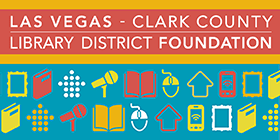The Las Vegas-Clark County Library District recently received a $20,000 grant from the American Library Association (ALA) COVID Library Relief Fund that will help extend the reach of the Library District’s groundbreaking Cell Phone Lending Program, providing critical lifelines for low-income residents, and those experiencing homelessness.
Funded by a $200,000 grant from the Institute of Museum & Library Services and the Nevada State Library, the Library District’s Cell Phone Lending Program has provided more than 380 smart phones to qualifying residents, identified by Nevada Homeless Alliance and Nevada Partnership for Homeless Youth. Each phone comes pre-loaded with Library District apps that provide life-enriching and educational resources as well as critical social and community services. The new ALA funds will allow the Library District to provide phones for additional 35 residents.
Since its launch in April, the program is already seeing success stories. Several cell phone borrowers have reported that they were able to secure housing because they now have a phone number that housing agencies could call to notify them that their applications were approved.
The ALA COVID Library Relief Fund supports libraries' efforts to increase and enhance technology access, collection development, digital instruction, staffing, and outreach, while maintaining and amplifying existing services. Supported by Acton Family Giving, it recognizes libraries that provide needed services to traditionally underserved communities across the country, allowing libraries to have a critical impact on those who depend on them during these challenging times.
"It is an honor to help underwrite the gap-bridging efforts proposed by the ALA COVID library Relief Fund recipients," said Tracie Hall, ALA Executive Director. "This fund is part of our ongoing association-wide effort to support libraries during these still uncertain times. Understanding the fundamental role that libraries play in the health and welfare of their communities, ALA is committed to raising additional funds to sustain the educational persistence, workforce reskilling, and community recovery activity that is being funded through these grants."


